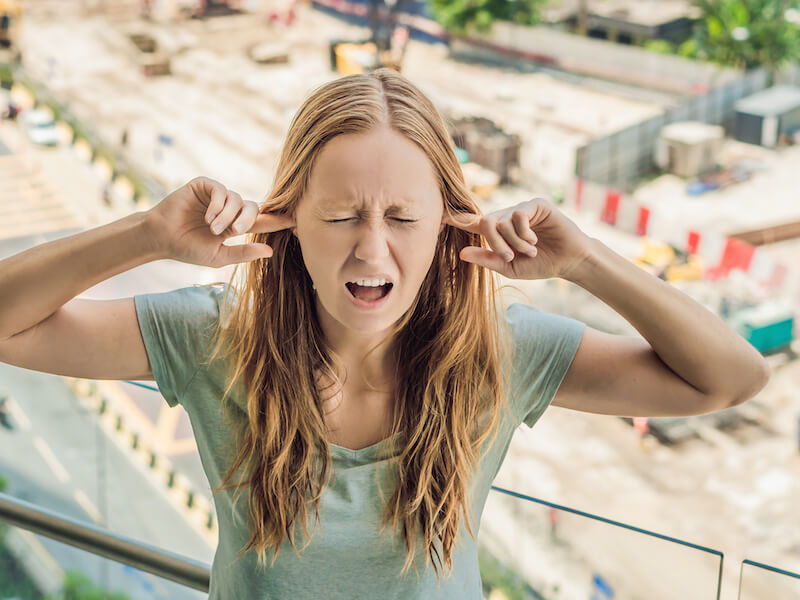If you have a partner with untreated hearing loss, you know that getting their attention can be… a challenge. First you try to use their name. “Greg,” you say–but you used a normal, indoor volume level, so you get nothing. You try saying Greg’s name a little louder and still nothing. So finally, you shout.
And that’s when Greg whirls around with absolutely no self awareness of his comedic timing and says crossly, “What are you shouting for?!”
It’s not just stubbornness and irritability that creates this interaction. Hypersensitivity to loud sound is often reported in those with hearing loss. And this sensitivity to loud noises can help explain why Greg can’t hear his name at a normal volume–but gets cranky when you shout at him.
Can Hearing Loss Make Loud Sounds Worse?
So, hearing loss is kind of funny. The vast majority of time, you’ll hear less and less–especially if your hearing loss remains untreated. But every once in a while, you’ll watch a Michael Bay movie or be having a conversation or be eating in a restaurant–and things will get really loud. Uncomfortably loud. Maybe it’s someone shouting to get your attention or one of the explosions in the newest Transformers film–it just gets really loud really fast.
And you’ll think: Why am I so sensitive to loud noise?
Which can also make you feel a little cranky, honestly. Many people who notice this will feel like they’re going crazy. And it’s because they can’t get a handle on how loud anything is. Imagine all of your friends, family, and acquaintances seem to confirm you’re losing your ability to hear–but you have this sudden sensitivity to sound. It feels like a contradiction.
Auditory Recruitment
The cause of this sound sensitivity is a condition called auditory recruitment. Here’s how it works:
- The interior of your ears is covered in tiny hairs called stereocilia. When soundwaves enter your ears, these hairs vibrate and your brain translates that signal into sounds. (It’s really cool and kind of weird when you think about it.)
- Damage to these hairs is what causes age-related sensorineural hearing loss. Loud sounds can degrade the hairs over time–and once they are injured, they are unable to heal. As a result, your hearing becomes less sensitive. The damaged hairs you have, the less you can hear.
- But this process doesn’t happen evenly. There is always some mixture of damaged hairs and healthy hairs.
- So when you hear a loud noise, the damaged hairs “recruit” the healthy hairs (hence the name of the condition) to send an alarmed message to your brain. So, suddenly, everything is very loud because all of your stereocilia are firing (just as they would with any other loud noise).
Think about it like this: everything is quiet except for the Michael Bay explosion. So the Michael Bay explosion is going to seem louder (and more obnoxious) than it would otherwise!
Isn’t That the Same as Hyperacusis?
Those symptoms might sound a little familiar. That’s probably because they’re often confused with a condition called hyperacusis. That conflation is, at first, understandable. Auditory recruitment is a condition in which you have a sensitivity to loud noises, and hyperacusis is a condition in which sounds very suddenly get loud.
But there are some key differences:
- Hyperacusis is not directly related to hearing loss. Auditory recruitment definitely is.
- Hyperacusis is painful. Literally. Most people who experience hyperacusis report feelings of pain. That’s not necessarily the case with auditory recruitment.
At the end of the day, auditory recruitment and hyperacusis have some superficially similar symptoms. But they are very different conditions.
Can Auditory Recruitment Be Treated?
The bad news is that there’s no cure for hearing loss. Once your hearing is gone–it’s gone. (Treatment of hearing loss can prevent this, largely.)
The same is true of auditory recruitment. But the good news is that auditory recruitment can successfully be treated. In most cases, that treatment will involve hearing aids. And those hearing aids need to be specially calibrated. That’s why treating auditory recruitment will nearly always require seeing a hearing specialist.
Your hearing specialist will be able to identify the specific wavelengths of sound that are causing your auditory recruitment symptoms. Your hearing aids can then be calibrated to diminish that wavelength of sound. It’s kind of like magic, only it’s using science and technology (so, not really like magic at all–but it works really well is what we’re trying to convey here).
Successful treatment can only be accomplished with certain types of hearing aids. Over-the-counter hearing aids or sound amplifiers, for example, do not have the required technological sophistication and built-in sensitivity, so they will not be able to address your symptoms.
Make An Appointment with Your Hearing Specialist
If you are experiencing sensitivity to loud sounds, it’s important to know that you can find relief. You will also get the added benefit of using a hearing aid to improve your life’s soundscape.
But it all starts by making an appointment with your hearing specialist. Clearly, this will help Greg’s relationship with his partner–and it can also give you some much needed peace of mind. This hypersensitivity is a normal part of the hearing loss process–it happens to many, many people.
But it doesn’t have to keep making you miserable.



